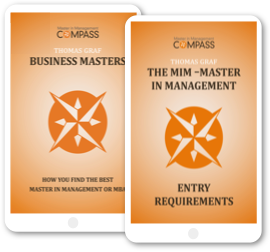What do business schools expect from candidates applying for a Master in Management (MIM)? How do they select their students? How important are tests such as the GMAT? And how do schools weight interviews?
MIM Compass provides the first survey worldwide on entry requirements for Masters in Management. 54 business schools from 21 countries participated. The survey was conducted from December 2014 to January 2015 and published in September 2015.
Key Survey Results
- According to the survey, business schools (cf. list below) have one most important criterion when they select their Master in Management (MIM) students. This criterion is the grade achieved in the applicant’s previous studies.
- Practical experience and analytical tests such as the GMAT are seen as the most important alternative criteria when expected academic results from previous studies are missing.
- About one third of the schools do not conduct interviews at all. Only one out of three schools – among those that conduct interviews – weights the interviews by 50 percent or more. This means that in many cases the interview plays only a minor role when it comes to the final acceptance.
- A little over half of the schools do not require an analytical test at all. At the other extreme, 6 percent require the GMAT only. 26 percent require the GMAT or GRE and 13 percent accept their own on-campus test as an alternative to the GMAT or GRE. Master in Management applicants, hence, have a lot of options.
- On average, schools require a minimum GMAT score of 600. The GMAT score that Master in Management students of the schools’ last intake actually had, however, was higher than the expected minimum score: 650.
- What do schools recommend applicants if their GMAT score is a bit lower but still in the acceptable range. Most schools (84 percent) recommended applying without redoing the GMAT. The GMAT, hence, seems to be just a necessary condition for most schools. However, once this condition is met, there is less reason to invest more time in it, as the final decision about accepting an applicant or not will be made based on other criteria.
The full survey report including the answers from 54 business schools are available at www.mim-compass.com/ebook, as epub or mobi/kindle. MIM candidates find each business school's individual profile and the entry requirements of its Master in Management.
Schools participating in the survey "MIM Entry Requirements"
- Aix-Marseille Graduate School of Management - IAE
- Alpen-Adria Universität Klagenfurt
- Antwerp Management School
- Audencia Nantes School of Management
- Bocconi University
- Brunel University
- Catolica Lisbon School of Business and Economics
- CNAM - Institute of Management
- Cologne Business School
- Cranfield School of Management
- Deusto Business School - University of Deusto
- Durham University Business School
- EADA Business School Barcelona
- EDHEC Business School
- ESADE
- ESCP Europe Business School
- ESMT
- ESSEC Business School
- Fontys University of Applied Sciences
- Frankfurt School of Finance & Management
- HEC Lausanne
- HEC PARIS School of Management
- HFU Business School J8- University Furtwangen
- IAE Bordeaux University School of Management
- ICN Business School Nancy-Metz
- IE Business School
- Johannes Kepler University
- Kuehne Logistics University
- London Business School
- London School of Economics and Political Science, Department of Management
- Manchester Business School, The University of Manchester
- MGSM - Macquarie Graduate School of Management
- MIP Politecnico di Milano
- Munich Business School
- Nottingham Business School, Noittingham Trent University
- Nyenrode Business Universiteit
- Philipps- Universität Marburg
- S P Jain School of Global Managment
- Saunders College of Business at RIT
- SPbU, Graduate School of Management
- Stockholm School of Economics
- Trinity College Dublin, Ireland
- Università della Svizzera italiana
- Università di Bologna
- University of Bradford
- University of Cologne, Faculty of Management, Economics and Social Sciences
- University of Economics, Prague
- University of Erlangen-Nuremberg
- University of Lethbridge
- University of Manitoba, Asper School of Business
- University of Trento, Italy
- University of Windsor
- Warsaw School of Economics
- WHU - Otto Beisheim School of Management
By Thomas Graf









